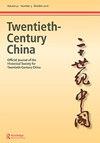Revolutionary Bedsheets: Industrial Design and the Material Properties of Maoist China
IF 0.4
Q1 HISTORY
引用次数: 0
Abstract
Abstract:The growing scholarship on consumption has offered provocative new ways of using consumer goods as a lens to understand social relations, political subjectivity, and economic institutions in Mao’s China. However, the prevailing social-centered paradigm often views consumer goods as an abstract category rather than as materials with differing qualities. The literature has rarely considered the properties of materials, such as weight and durability, in connection with the nature of the Maoist system. By looking at materials in their own right, this article focuses on the material properties of a consumer product prominent in the Mao era and afterward: the Minguang brand of floral-patterned bedsheets, affectionately known as China’s “national bedsheet.” My research reveals that as a material embodiment of key differences between the Maoist system and other political-economic systems, the Minguang bedsheet’s material form was the result of understudied yet defining characteristics of the Maoist system, such as economic autarky, socialist realist industrial design, opposition to planned obsolescence, and an obsession with cotton fibers.革命床单:毛时代中国的工业设计和材料特性
摘要:关于消费的学术研究不断增长,提供了一种具有挑衅性的新方法,以消费品为视角来理解毛时代中国的社会关系、政治主体性和经济制度。然而,主流的以社会为中心的范式往往将消费品视为一个抽象的类别,而不是具有不同品质的材料。文献很少考虑材料的特性,如重量和耐用性,与毛主义制度的性质有关。通过对材料本身的研究,本文将重点放在毛时代及其后一种重要消费品的材料特性上:被亲切地称为中国“国民床单”的民光牌花卉床单。我的研究表明,作为毛主义制度与其他政治经济制度之间关键差异的物质体现,民光床单的物质形式是毛主义制度尚未充分研究但明确的特征的结果,例如经济上的自给自足,社会主义现实主义工业设计,反对计划报废,以及对棉纤维的痴迷。
本文章由计算机程序翻译,如有差异,请以英文原文为准。
求助全文
约1分钟内获得全文
求助全文

 求助内容:
求助内容: 应助结果提醒方式:
应助结果提醒方式:


